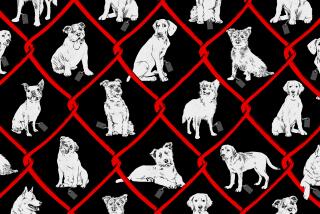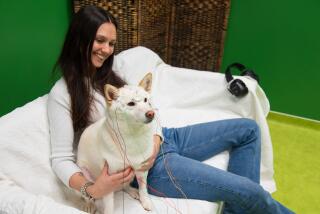Womanâs Deafness Proves No Barrier to Listening
As a girl, Laurie Hulsman was a tomboy swinging from trees, avoiding uncomfortable and often painful contact with other children, instead relying on her pet dogs for comfort.
Dogs, it seemed, understood the trials of a deaf child. Eye contact and touch were enough.
It was harder with humans. Hulsman later suffered through too many jobs where nobody knew sign language, places where co-workers would avoid her entirely or rudely walk away rather than attempt conversation with a woman who struggled to hear and form her own words.
Only in her 40s has Hulsman found her niche, one that has taken her back to the creatures with whom she has always felt most at home:
She runs a dog-walking and pet-care service called Prudyâs Pals, named after one of her own former pets.
For the last seven years, Hulsman, a 48-year-old Westside resident, has been her own boss, spending her time caring for the dogs, cats, birds and rabbits of an increasingly loyal clientele.
âIt feels great,â she said, her diction slightly slurred, after taking two dogs on a noon-hour walk for a Santa Monica customer. âFor the first time in my life, I feel good about myself. When I wake up in the morning, I actually look forward to going to work. Now my dogs are my priority.â
Hulsman says her success story holds a lesson for both fellow deaf people and the rest of the world: With the proper training, direction and encouragement, the hearing-impaired can do any job, take on most any task.
Donât call them deaf mutes; itâs an insult. Donât just yell louder if they say they canât hear you, she says. If they come to you for a job, listen to what they have to say.
People who can hear havenât always listened to Hulsman.
At first, potential clients wouldnât trust their beloved pets to the care of a deaf woman: How could she make out the car horns on the street? How could she hear the dogs bark, or the cats meow? How could they even talk to her over the telephone?
These days, though, people believe. And Hulsman has worked hard to earn their trust. Unable to pronounce one dogâs name, she went home and practiced with her mother for days until she could call âHere, Cirrus!â in a crystal-clear voice.
Customers say Hulsman has a rare bond of communication with their pets; some believe it comes from coping with her disability.
âShe doesnât treat them like beasts; she treats them like her children,â said client Steve Oster. âSheâs not there just to give them food and water.â
There are things that Hulsman cannot do. With her hearing aids turned off, she cannot make out most sounds. But with them on, she is decidedly independent. She can drive a car and talk on the telephone (only low male voices and foreign accents give her trouble).
She has read lips since childhood, and many people cannot tell she is deaf until she informs them, or asks them to slow their speech down.
She struggles with many words. With her accent, many people think sheâs from France. âThank you very mush,â sheâll say.
Born with her disability, Hulsman ignored it as a child by doing things that didnât require listening. She painted. She swam, and even became a competitive surfer. With her mother, she practiced talking over the telephone, deciphering the messages from the disembodied voice. Over and over, she repeated the words she had trouble saying.
And she always had her dogs, six of them over the years, from her boxers to her lovable mixed breeds.
But adulthood hit hard.
For years, she worked as a cartoon artist for a major studio and found the workplace an insensitive environment for a woman who struggled to hear. âPeople would just rather not have you around,â she said. âLong conversations were always hard, and people just avoided me. It hurt.â
Hulsman lost her job during industry layoffs in 1990 and began looking for other work. She soon found that potential employers were no more receptive than her former co-workers.
âPeople would say, âWell, if you canât use the telephone, then we canât use you,â â said her mother, Dorothy Goodman. âShe didnât feel like people were really giving her a chance. Instead, they put her down. They must have told her âItâs just not going to work outâ a million times.â
So Hulsman decided to try dog-walking. She posted notices at pet stores and veterinary offices. Still, the doubters seemed to follow her into the new endeavor. âWhen clients would call, Iâd tell them I was hearing-impaired,â Hulsman said. âMany didnât bother to call back.â
Slowly, her customer base grew. Sheâs now up to 18 clients and is ready for more.
Attorney David Littleton, who pays Hulsman $15 a day to walk his two Weimaraners, remembers his first interview with his new dog walker. âIt was as much her approving of me as my accepting her,â he said. âItâs important for Laurie to walk dogs for people who are very dedicated to their pets.
âShe has noticed subtle little cues that I didnât even see,â he said--the expressions on their faces, their body language, the way they walk and hold their heads. âIt might be a stretch to say that sheâs better with animals because of her impairment. But she is extremely observant and unusually compassionate.â
When she spots a dog or cat left inside a parked car, she always leaves a brochure about properly caring for pets in automobiles.
Often, Hulsman will stay at her clientsâ homes when they are away--a real challenge for a hearing-impaired person. But she takes cues from their dogs.
âMy dog Sasha knows to touch Laurie when he wants to go out,â said Santa Monica client Charlotte Joseph. âWith me, he goes to the door, but with her he goes and scratches her feet and lets her know. Their relationship is a mystery to me. He seems to know she canât hear.
âBut I donât ask questions. Iâm just convinced that Laurie has a sixth sense when it comes to animals.â
More to Read
Sign up for Essential California
The most important California stories and recommendations in your inbox every morning.
You may occasionally receive promotional content from the Los Angeles Times.











